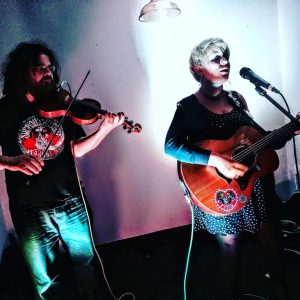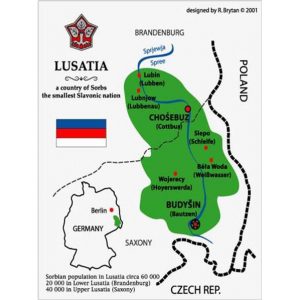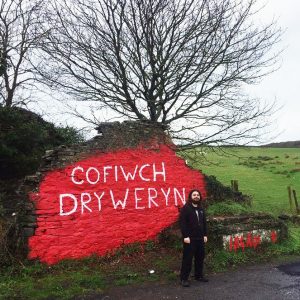We are very excited to announce that thanks to the Arts Council Wales International Opportunities Fund, we are working on a project with Sorbian musicians in Germany! Efa Supertramp and Cerys Hafana will be travelling with Chwalaw producer and electronic musician Nick Ronin to Germany at the end of April for a residency in Chóśebuz/Cottbus – where we will be jamming, recording and creating songs through our minority languages Welsh and Sorbian! Expect traditional instruments combined with electronic elements and experiments – we’re going to enjoy the creative process and see what we come up with. This blog will document what we get up to, but first I’ll tell you a bit more about how the project came to be.

So how did the idea for this Sorbian/Welsh project come about?
In my teenage years, I played in a Welsh-language punk band called The Stilletoes and in my 20s started performing solo as Efa Supertramp. I travelled all across Europe playing in autonomous spaces and squats; making connections with activists and musicians wherever I went. In 2018, in an anarchist squat bar in Berlin, I was performing under my folk-punk alias and I met a violinist who performs under the name Geigerzähler. He was thrilled that I was singing in Welsh because he also spoke a minority-language from East Germany called Sorbian. We bonded immediately as two individuals who are part of a wider-European anarchist punk scene but passionate about our languages and cultures. Both myself and Geigerzähler use our music to support activist causes, such as anti-gentrification protests or refugee solidarity events. We both also create music in our minority mother-tongue languages and play it proudly and loudly across the dominant states we live in – UK and Germany.

The Sorbs make their home in the Brandenburg-Saxony region of Germany, not far from the capital Berlin. Around 60,000 Sorbs live there today. At the beginning of the last century, Sorbian was still the most-widely heard language in many areas of Brandenburg and Saxony but that changed during the years of the Nazi dictatorship in Germany. The Nazis strictly forbid the Sorbs to use their language. Sorbian clubs, books, dancing and even church services held in the language were banned; Sorb teachers were expelled from the region and Sorb anti-fascists were murdered or sent to concentration camps.
Geigerzähler was born while Berlin was still divided – in a small town called Budyšin (or Bautzen in German). He was quickly thrown into the educational system of the GDR and had to learn the violin, and became an extremely competent musician. After the wall came down, he cut himself a mohawk, quit school and started an apprenticeship as squatter; which unfortunately was halted by the riot police. His violin was destroyed, but he quickly got a new one because he wanted to play punk and didn’t want to learn to play the guitar….

In 2019 Geigerzähler and I (Efa Supertramp) organised a tour together where we performed seven dates across England and Wales (the Welsh concerts were in Bethesda, Cardigan and Newport). Each night we performed in a total of four languages (Welsh, Sorbian, English and German). Ever since our first tour together, Geigerzähler has wanted to invite me to come and perform in the Sorbian region. However due to coronavirus this has not yet been possible and, of course, the world has changed a lot for musicians and we’ve had to find new ways of working! I’m so happy that thanks to Arts Council Wales International Opportunities Fund, this is finally happening and I get to spend 5 days creating with Sorbian musicians. Our collaborators from the Sorbian region have also got another grant which means we will return in the Autumn to perform some of the songs from the project live! We will be working with members of kolektiwWakuum from Cottbus who are supporting us by providing a space and some film-makers to document some of what we get up to. I’m really looking forward to being in a room of people, enjoying the creative process and just seeing what we come up with. We have been meeting on Zoom to start organising this week of music-making!
